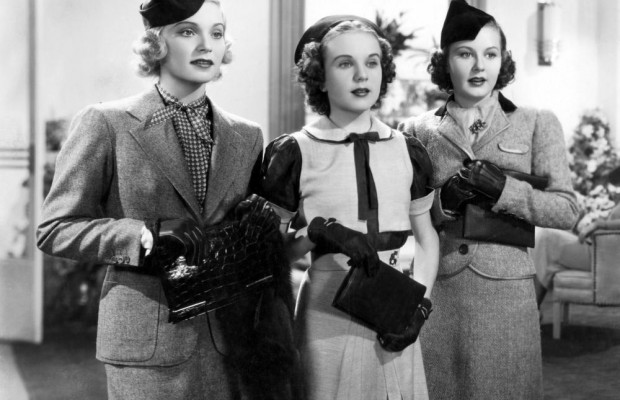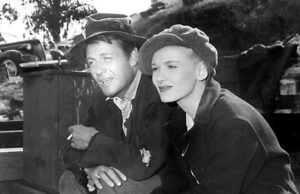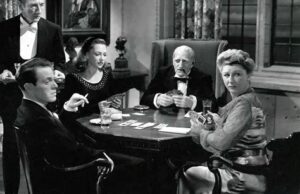Three Smart Girls (1936)
By Toronto Film Society on July 18, 2015
Toronto Film Society presented Three Smart Girls (1936) on Monday, November 29, 1976 in a double bill with the short Every Sunday and His Butler’s Sister as part of the Season 29 Monday Evening Film Buff Series, Programme 3.
Production Company: Universal. Executive Producer: Charles R. Rogers. Producer: Joseph Pasternak. Director: Henry Koster. Screenplay: Adele Comandini, Austin Parker, based on a story by Adele Comandini. Photography: Joseph Valentine. Editor: Ted Kent. Music Director: Charles Previn. Songs: Gus Kahn, Walter Jurmann, Bronislau Kaper “My Heart Is Singing“, “Someone To Care For Me“‘ Luigi Arditi “Il Bacio“. 2nd Assistant Director: Vaughn Paul. Sound: Homer G. Tasker.
Cast: Binnie Barnes (Donna Lyons), Alice Brady (Mrs. Lyons), Ray Milland (Lord Michael Stuart), Charles Winninger (Judson Craig), Mischa Auer (Count Arisztid), Nan Grey (Joan Craig), Barbara Read (Kay Craig), Deanna Durbin (Penny Craig), Ernest Cossart (Binns), Hobart Cavanaugh (Wilbur Lamb), John King (Bill Evans), Lucile Watson (Trudel), Nella Walker (Dorothy Craig), Franklin Pangborn (Salesman).
Previewed in late December, 1936, in Los Angeles. Released in New York on January 24, 1937.
Nominated for three Academy Awards for 1936: Best Picture, Best Original Story, Best Sound Recording.
Henry Koster (Hermann Kösterlitz) was born in Berlin on May 1, 1905. He began his career as a commercial artist, cartoonist, drama and film critic before graduating to screenwriting and finally directing. He produced, wrote and directed short films in Germany from 1926; by 1927 he had moved over to the giant UFA studios, and soon after joined the Berlin Studios of Universal. He wrote and directed his first feature film in 1932, Das Abenteur einer Schönen Frau, then had good success with several Hungarian and Austrian films–Peter (1934), Maria Baschkirtzeff (The Affairs of Maupassant, 1935), Katharina (1935). Koster had already commenced his working relationship with producer Joe Pasternak during these films when the call came from Universal to come to Hollywood. The first film for Koster&Pasternak in the USA was Three Smart Girls. Five of the next six Koster films were Deanna Durbin vehicles: One Hundred Men and a Girl, First Love, Three Smart Girls Grow Up, Spring Parade, and It Started With Eve (1941), which was also the last film Pasternak produced for Durbin.
Some of Koster’s notable films include: The Rage of Paris (1938)–a sophisticated, charming comedy which was the only non-Durbin film Koster made fro 1936 to 1941, The Bishop’s Wife (1948), Come to the Stable(1949), The Inspector General (1949), Harvey (1950), Mr. Belvedere Rings the Bell (1951), No Highway in the Sky (1951), My Cousin Rachel (1952), The Robe (1953), Desiree (1954), The Virgin Queen (1955), My Man Godfrey (1957), Mr. Hobbs Takes a Vacation (1962) and his final film to date, The Singing Nun (1965).
Except for some prestige pictures in the mid 50’s, most of Koster’s filmography consists of light comedy romances. The poor critical and popular reception of his last movies clearly indicated that his time was past–yet all of his pre-war work, and some isolated films thereafter, showed a delightful European sensibility and taste. Current critical evaluation completely overlooks Koster’s visual flair and tasteful, self-deprecatory humor–qualities that were at their peak during the early Durbin era and combined with her aforementioned strengths to effectively launch her entire career.
The ending of Three Smart Girls contains one of the finest bits of emotional pantomime I’ve ever seen, as poignant and memorable as Chaplin’s reaction to being recognized by the blind girl at the end of City Lights. In Three Smart Girls, the parents of the three girls are finally reunited, and Durbin stands between them, looking at their locked hands, then at one parent, then at the other. Her face vacillates extreme joy and sadness in several different shadings and nuances, all in the matter of five seconds. It is a kind of sensitive acting that cannot be taught at any age, let alone to a girl of fourteen!
Notes written and compiled by Jaan Salk
(This review is part of the article The Career of Deanna Durbin under the News tab)
You may also like...
-
News

Frances Blau
Toronto Film Society | February 27, 2024On Monday, February 26th, 2024, Toronto Film Society lost longtime friend, supporter, and board member Frances Blau. Known for her sense of humour, her love of film, her generosity,...
-
Special Events

Monday Evening Film Noir Double Bill at the Paradise Theatre
Toronto Film Society | July 8, 2024The Toronto Film Society presents a film-noir double feature at one low price! The Window (1949) in a double bill with Black Angel (1946) at the Paradise Theatre on Monday, August...
Programming

Virtual Saturday Night at the Movies
Toronto Film Society | July 20, 2024Toronto Film Society is back in the theatre! However, we’re still pleased to continue to bring you films straight to your home! Beginning Season 73 until now we have...
4-
 Toronto Film Society | July 8, 2024
Toronto Film Society | July 8, 2024
Monday Evening Film Noir Double Bill at the Paradise Theatre
-
 Toronto Film Society | November 6, 2022
Toronto Film Society | November 6, 2022
-
 Toronto Film Society | August 1, 2023
Toronto Film Society | August 1, 2023
Donate to Toronto Film Society – We’re now a Registered Charity!
-
Copyright © 2017 Toronto Film Society.







Leave a Reply